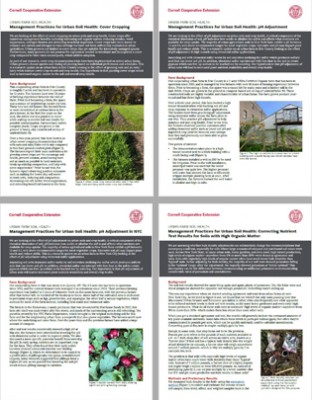Management Practices for High Organic Matter Soils: Urban Case Studies
Lori Koenick, Project Assistant
Cornell Vegetable Program

We are exploring management practices for vegetable farmers with high organic matter soils. These soils are usually found in urban growing areas as urban farmers typically grow in imported soil mixtures that have been constructed over time and in high tunnels where leaching events are limited. In both cases, we see that soil pH and calcium levels can increase due to alkaline irrigation water and with grower inputs such as high levels of compost and/or fertilizer. We commonly see limited plant nutrient uptake due to high soil pH. We have produced four "Management Practices for Urban Soil Health" case studies sharing project updates in our urban cover crop, pH adjustment, and bulk density adjustment work. In each case study, we are looking at the effect of the management practice on soil and crop health.
Management Practices for Urban Soil Health: Cover Cropping
Here are findings from a demonstration trial on an urban farm in Erie County looking at the effect of growing oats and an oats/hairy vetch mixture cover crop on soil and crop health compared to bare ground controls. Cover crops offer numerous management benefits and have been shown to enhance soil carbon and nitrogen in rural settings. Yet, they have not been sufficiently evaluated in urban agriculture. Urban growers can be limited to cover crops that are suitable for intensively managed spaces. Further deterring adoption, many growers do not possess the equipment needed to terminate and incorporate a cover crop compared to their rural counterparts. In this case study, we describe cover crop planting and management strategies. Soil test results are mixed, yet we found some evidence of cover crop benefits on urban farms.
Management Practices for Urban Soil Health: pH Adjustment
Here we share findings from a demonstration trial on an urban farm in Erie County looking at the effect of pH adjustment in high tunnels using elemental sulfur applications. A critical component of the chemical dimension of soil, pH affects what nutrients are available for crop uptake. The majority of urban agricultural soils in New York State exhibit a pH between 7.1 and 8.1, well above recommended ranges for most vegetable crops. In this demonstration trial, we had a treatment plot where elemental sulfur was applied twice over a three-year period and a control plot. In our soil and foliar test results, we found some evidence of elemental sulfur lowering soil pH. Further work looking at the duration of the effect and application rates are warranted. We also noted high soil calcium levels which we speculate could impact the effects of sulfur application on soil pH and high salt levels which could stress plants and affect yields. Management strategies are discussed.
Management Practices for Urban Soil Health: pH Adjustment in NYC
Here we discuss more findings on the effect of pH adjustment using elemental sulfur applications in a demonstration trial at a New York City urban farm. At this farm, farmers were interested in sulfur applications to lower soil pH to increase crop yields and to manage pillbug root feeding damage on radish. In this demonstration trial, we had two treatment plots where elemental sulfur was applied twice over a two-year period and two control plots. In our soil test results, we found evidence of elemental sulfur lowering soil pH. Farmers reported increased yields and reduced pillbug damage in treated areas. We plan to continue exploring the effects of pH adjustment at this site with foliar testing.
Management Practices for Urban Soil Health: Correcting Nutrient Test Results for Soils with High Organic Matter
In this case study, we describe our work assessing whether bulk density adjustments can substantially change the recommendations that accompany a soil test, especially for soils where large amounts of compost and purchased soil mixes are used. These soils with especially high levels of organic matter often have much lower bulk densities than predominantly mineral soils. We measured the bulk density of soils at nine urban farms along with standard soil nutrient tests and, where possible, foliar tests to measure nutrient levels present in the plants. We found that before adjusting for bulk density, the majority of our soil tests showed potassium falling in the "optimal" range. After the adjustment, the majority showed potassium at "below optimal." This discrepancy can be the difference between recommending no additional potassium to recommending considerable rates of potassium soil amendments. For anyone puzzling over a disconnect between soil test results and nutrient deficiencies in the field, with a soil that's high in organic matter, this approach might be worth a try
Interested in learning more?
Contact project team members Sam Anderson of CCE Harvest NY, Lori Koenick or Judson Reid of the CCE Cornell Vegetable Program.
This work is funded by a USDA NRCS Conservation Innovation Grant "Best Management Strategies for High Organic Soils in Urban and Rural Vegetable Production."
Management Practices for Urban Soil Health: Cover Cropping (pdf; 944KB)
Management Practices for Urban Soil Health: pH Adjustment (pdf; 592KB)
Management Practices for Urban Soil Health: pH Adjustment in NYC (pdf; 533KB)
Correcting Nutrient Test Results for Soils with High Organic Matter (pdf; 265KB)


































